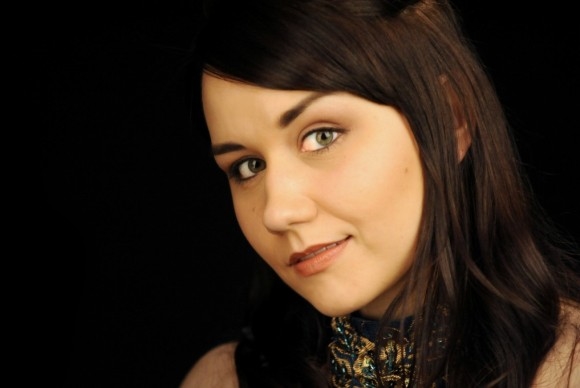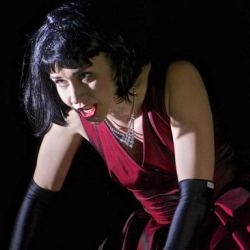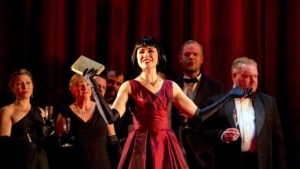Elizabeth Zharoff, ENO's Violetta: 'Jeez, I'm glad she's dead'
The Californian singer, dancer and video game composer on her career past, present and future

© Peter Konerko
So what brought her to these shores?
"John McMurray [head of casting at ENO] heard me at the Curtis Institute and suggested I should come over and sing in the Coliseum. I was going to be in Dresden for the year and we thought I’d be released to do this Traviata at its first staging in 2013, but Dresden said no to three months away so Corinne Winters, whom I know and love, took over. When it came back round they asked again and I said yes – thank goodness!
"It’s good that I had the chance to learn Violetta in Italian first, because I was able to understand how the original language sits with it and get to understand that before putting it into English. If I’d sung it here first time round my first Traviata would have been in English.
"Some translations feel weird but this one is excellent. And Martin Fitzpatrick, the translator, is on the staff at ENO so if there’s anything I find hard to sing – maybe three or four words in the entire opera – I can ask him and he’ll change it. He’s so easy to work with. The other thing I love about singing in English is that for me there’s an instant emotional attachment to every word you sing. It’s immediately real. When I sing it in Italian the emotions are there but they’re not as instantly accessible.
"It’s almost depressing to be in her state"
"I was the only new one in this cast so there was pressure to learn things quickly. But I like that. And my colleagues were very, very helpful. Honestly, this cast and crew – everyone – we get along remarkably well.
"This production is tough because there’s no intermission. Vocally I don’t know if it’s that big a difference for me, but emotionally and keeping focus – that’s difficult. Being willing to be vulnerable for that long makes Violetta a lot more personal to me. It’s almost depressing to be in her state. I’m not the kind of singer who acts from the outside; I do my best to put myself in her position and draw on my own life experiences to make it real. By the end I’m all done and I say ‘Jeez, I’m glad she’s dead so I can leave all that behind’.
"Right after this I’ll be singing one of my favourite roles, Marguerite in Gounod’s Faust, at West Bay Opera, which is close to my home town in California; and next fall for Seattle Opera I’ll be singing Leïla in The Pearl Fishers.

© Francis Loney
"But one of the most exciting things I’m preparing is an opera with the composer Ricky Ian Gordon. He’s very well known in the States and I had the good fortune of getting to know him several years ago and working with him on song cycles. Ricky’s one of the most inspiring people I’ve ever met, and he’s asked me to appear in his new opera Morning Star in Cincinatti. I’ll be there in May and June working on that. I’ve never created a role before and I cannot think of a composer I’d rather do it for than Ricky.
"About a year ago I started getting into video games. I’ve always loved gaming but I never realised that I could contribute to them. As a singer I have a lot of time on my hands between shows when I'm supposed to be quiet and anti-social, taking care of myself. I didn’t want to spend all my time watching TV shows or reading tons of fiction (though I do that some!), I wanted it to be productive – still making music, just not singing. I’ve always composed – I’d thought about doing my first degree in piano – so I looked at new ways I could approach music.
"You have to learn the electronic and software side of it, which took six months. I’m based in Silicon Valley in California where there are lots of indie developers and gamemakers, so I showed them what I’d composed and they invited me to a game jam. What’s a game jam? It’s a weekend where programmers and artists get together and make a game in one weekend. So it’s all crammed in… but I can compose very quickly! Since then I’ve been doing lots of game jams.
"Someday I’ll sing a killer Butterfly"
"If you go to concerts of video game music being performed live, the fans go crazy for it. They love orchestral music. I think opera and video games can be merged even more and I want to help with that. It’s an entirely new way to look at music, and it makes me appreciate opera all the more.
"I’d really love to sing Tatyana [in Eugene Onegin] and Manon before long, and someday I’ll sing a killer Butterfly and Salome. That day may be coming sooner rather than later because I’m moving into heavier repertoire now. Some people like to make long-term plans for their career, but we’re talking about a human body – it kind of decides on its own. In the past five years my voice has grown very quickly, to the point where I was expecting to be singing Lucia [di Lammermoor] and Gilda [in Rigoletto], but I don’t think I’ll be singing those now. I need to be singing more lyric roles like Tatyana and Mimì [La bohème].
"I’ve been a dancer for 14 years, which is an advantage in my stage work because I know how to move. And when I trip up on something I can catch my balance! Developing physical skill alongside theatre skills is incredibly important. You have to know how a certain pose can portray a particular emotion, and if I’m running onstage and then have to sing a high note I still have to have breath underneath me to be able to do it. And there are many times when Violetta needs to be able to fall and keep going .
"Even when I’m not dancing I take care of my physical health. Your vocal cords are part of your body, and if you want your vocal cords to perform well you have to look after the rest of you."













